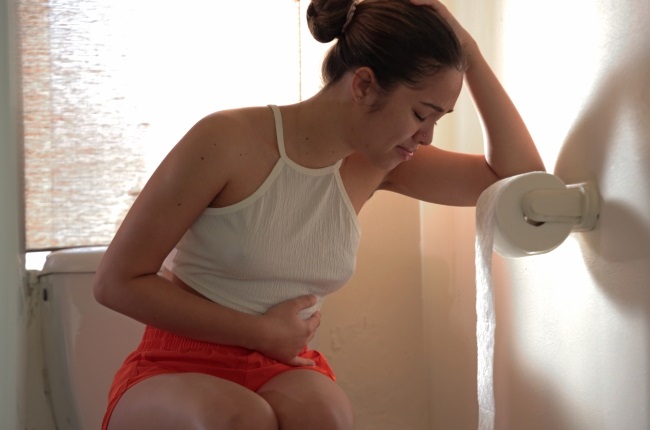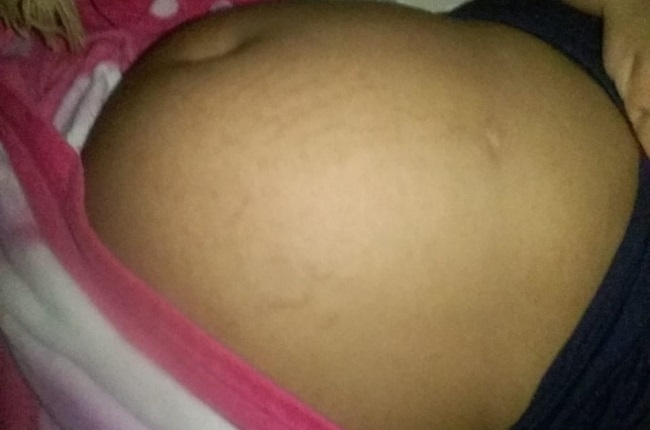
They often hear that they are exaggerating. That it's just really bad period pains and they should take a pill and sleep it off.
If they could, they would, but there's nothing easy about dealing with endometriosis.
Their days are filled with mood swings, fatigue, weight gain, bloatedness, irregular menstruation which can cripple social relationships.
These are just some of the symptoms of endometriosis but it can be hard to understand the depth of its effects.
Before sharing her story with Drum, 27-year-old Nokuthula Khumalo says that sometimes not even doctors understand the pain that she soldiers through everyday of her life.
“I can't walk. I bleed non-stop for weeks [and sometimes] months depending on my body.”
At times, she also has huge bloodclots which Drum has seen in pictures.
A normal life is something she hasn’t lived in years as she wakes up to “never ending infections including bladder, UTI (Urinary Tract Infections), yeast hormonal imbalances, migraines” if she ever sleeps even.
When bleeding, she doesn’t feel like eating, isn’t able to bathe herself and has a blurry vision that lasts for long hours. And yet when she had a laparoscopy (surgical procedure to access the inside of the abdomen (tummy) and pelvis without having to make large incisions in the skin) in 2019, doctors found nothing amiss.
While this opens her conditions to other diagnoses like fibroids, the severity still points to one condition. “It’s not just ‘a bad period’ and people struggle on a daily basis with this condition,” says endometriosis activist (endo-warrior) Bontle Moka.
According to Dr Johanna Moloisane, endometriosis is a condition that involves an endometrium (the layer of tissue that lines the uterus) “getting trapped elsewhere in the body, resulting in inflammation and pelvic pain”.
Dr Moloisane admits that the pain is so unbearable that “most women suffering from endometriosis feel that most people believe that they are exaggerating the intensity of their pain”.
Sharing the same sentiment, Bontle tells Drum that “many [women] experience gaslighting and don’t get the necessary treatment at the right time and sadly some have died which I believe could have been prevented.”
Although she’s been sick since her first grade, Nokuthula was only diagnosed with endometriosis in 2016 at the age of 21. Since then, she’s “been on very strong medication even on anti-depressants and the pains have been getting out of control with each passing day” as it has progressed to the severest stage – stage four.
Like Zubeida Rewu who also heard about the condition for the first time when she was diagnosed at 11 years old, Nokuthula also didn’t understand fully how serious the condition was. This is the reason why Bontle took it upon herself to create an endo-warrior community which would provide not only support but information and knowledge on the condition.
Read More | This is why your first gynae visit is so vital, according to Joburg doctor Lusanda Shimange-Matsose
Stuck to her bed in pain while talking to Drum, Nokuthula says the condition has changed her life for the worst. She has had to quit school and work because she would be booked off sick for weeks, pass out or even bleed out uncontrollably in public, needing to change a whole outfit as a result.
For Zubeida, the pain has gone as far as losing a child by miscarriage. During one of her maternity check-ups, she was told that her baby was growing outside of her womb, and she would need to choose to save one life between hers and her baby’s.
“To be honest, I am taking it as it comes,” she says on her recovery since the ordeal. She says she's fortunate to have a supportive boyfriend who understands her condition.
The case differs with Nokuthula who has had to stop dating altogether because “the sex hurts. I would bleed, faint during sex [and] wake up in so much pain that I would end up in the ER”.
“I don’t want to date, I have to fight to get my health better I believe have hope and faith,” she adds.
As Bontle has found, “fewer dates out the house, only eating certain kinds of food, less moments of intimacy and sometimes none at all because of painful sex, the struggle of trying to have a baby, can be a lot even for an understanding partner”.
In addition to this, there is financial strain that requires huge sums of money for doctors, getting surgeries, paying for medication, rounds of IVF and everything else in between.
Currently, this is Nokuthula’s biggest struggle. She has been trying to raise funds for her medical expenses but there has been little to no luck on that.
At the moment, she is short of only R700 to buy her monthly medication pack after raising R2 800 on Twitter. Every month, she requires R3 500 for this.
What all this then trickles down to is mental ill-health. As much as she’s tried to fight it for years on end, Nokuthula worries that she might lose the fight one day.
“I suffer from chronic major depression and anxiety and over thinking. Constantly, scared, worried about your health, thinking you want your life back but then you think death will finish all the suffering.”
When waking up to a reality like hers, “you lose a part of yourself”.
Dr Moloisane confirms that there is indeed “a close correlation between anxiety, depression and endometriosis has been found by various researchers”.
This is caused by “especially the fear of the unknown as the condition is not curable, thus leading to depression.”
To treat this, Dr Moloisane recommends two ways:
Psychotherapy, individual and family therapy sessions
- To mobilise support for the woman and to provide the individual and family with more insight about the condition, and to explain the dynamics of the condition to other conditions such as depression and anxiety. This helps loved one understand not only the pains but how to manage the women or home and other relations.
Symptomatic treatments by the Psychiatrist
- These are antidepressants, anxiolytics to correct the mood swings and analgesics to minimise the pain. At times the pain interferes with the sleep pattern, then treatment that induces sleep (hypnotics) will be prescribed for a specific period of time.
Read More | ‘Just one child, please’ – a woman suffering from endometriosis shares her story
As someone who has also been living with the incurable condition for years, Bontle advises the following;
Always listen to your body
- If you need to rest and are able to, then do it. Usually, doctors might recommend birth control or even a hysterectomy at times - this is not a cure. It is important to find a specialist or at least a second opinion before making final decisions on how to deal with endometriosis and always advocate for yourself because chances are you might get dismissed or gaslighted, you know your body better than anyone.
Seek relief
- If you need painkillers then take them but of course detox those as often as possible. There are also practical things I use for pain relief such as raspberry leaf tea, yarrow, heating pads/patches, taking supplements (iron, magnesium, b complex, vitamin C and D), although I must admit it gets exhausting but it’s worth it. Applying magnesium oil or arnica, cutting down or staying away from caffeine, alcohol, sugar, processed foods, dairy milk (alternatives like rice milk, oat milk and almond milk are great), including ginger, turmeric, and cinnamon in as many things as possible is great for inflammation.
Be kind to yourself
- Speak kind words to yourself, your body is doing its best to fight the dis-ease, go easy on yourself. Different things will work differently for
everyone, so it’s mostly trial and error but taking it one day at a time helps. Diagnosed or not, what you’re going through is valid.
With March being endometriosis awareness month, Bontle says that raising awareness about this condition “doesn’t have to be grand gestures, but sharing posts on social media, having conversations with our mothers, grandmothers and include men in the conversation too about our periods”.
That way, there will be transparency about what is normal and what isn’t.
“One thing people should be aware of, is that pain is not normal, and in our society we have probably defaulted to just pushing through or being resilient that we might even miss symptoms that could be endometriosis,” she adds.
Roughly 190 million women of reproductive age globally suffer from this condition.




















